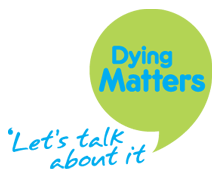Dying Matters 2012
Apr 25, 2012 by Victoria Noe, in anger and grief
, Dying Matters
, end-of-life decisions
, Small Actions Big Difference
Most people will do anything to avoid those end-of-life conversations. Who wants to talk about ‘extraordinary means’, much less who’s going to get your grandmother’s jewelry?
But doing so when we are able to not just discuss these issues but make decisions is something important for us all.
The Dying Matters Coalition was founded in London in 2009 “to support changing knowledge, attitudes and behaviours towards death, dying and bereavement, and through this to make ‘living and dying well’ the norm". It has 16,000 members (full disclosure: I’m one).
May 14-20 is Dying Matters Awareness Week. You may see stories pop up on TV and the Internet that will personify this year’s theme “Small Actions, Big Differences”.
It’s a great theme, because it explains those end-of-life conversations so well. Making decisions now about the kind of care you want will make a big difference not only to you, but to your family and friends.
Procrastinators do no favors for those left behind. The survivors will have a mess to clean up when you’re gone. But the worst part for them will be standing in a hospital corridor, talking to a doctor and admitting “I have no idea what they’d want.” They’ll have to guess, and they have a 50/50 chance of being wrong.
You probably have a clear idea of what you want, even though you’ve never articulated it. Because most likely, you know the kind of death you don’t want. Start with that.
Dying Matters website is a great source of information and forms to get you started. Yes, it’s a terribly uncomfortable and difficult subject to broach. But it’s important that everyone’s wishes for a “good death” are honored. And the only way that can happen is if they’re shared
You can also find Dying Matters on Facebook Dying Matters and on Twitter @DyingMatters


